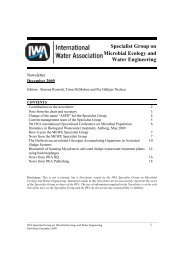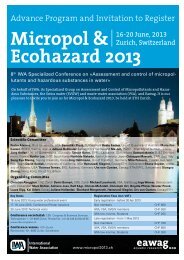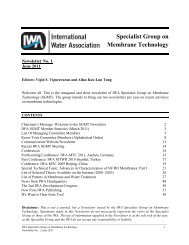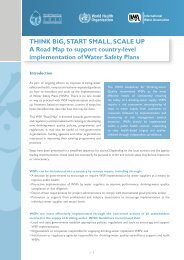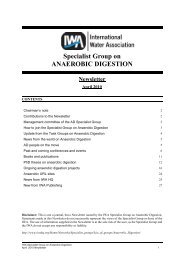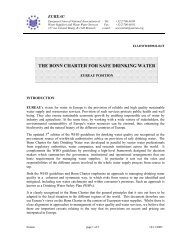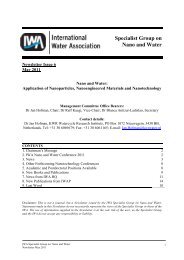Specialist Group on ANAEROBIC DIGESTION Newsletter - IWA
Specialist Group on ANAEROBIC DIGESTION Newsletter - IWA
Specialist Group on ANAEROBIC DIGESTION Newsletter - IWA
You also want an ePaper? Increase the reach of your titles
YUMPU automatically turns print PDFs into web optimized ePapers that Google loves.
Improving stability of anaerobic digesters for animal waste treatment<br />
by Marcelo Loureiro Garcia (mlgarcia@rc.unesp.br)<br />
New PhD C<strong>on</strong>tact:<br />
Assistant Professor<br />
Universidade Estadual Paulista (UNESP)<br />
Instituto de Geociências e Ciências Exatas de Rio Claro<br />
Departamento de Petrologia e Metalogenia<br />
Av. 24/A, 1515. Bela Vista<br />
Rio Claro, SP 13506-900, Brasil<br />
Tel: +55 (19) 3526 2833<br />
mlgarcia@rc.unesp.br<br />
Supervisor:<br />
Largus (Lars) Angenent, PhD<br />
Associate Professor<br />
Biological and Envir<strong>on</strong>mental Engineering<br />
Cornell University<br />
214 Riley-Robb Hall<br />
Ithaca, NY 14853, USA<br />
Tel: +1-607-255-2480 Fax: +1-607-255-4080<br />
la249@cornell.edu<br />
Abstract:<br />
In countries where c<strong>on</strong>centrated animal feeding operati<strong>on</strong>s (CAFOs) are used, implementati<strong>on</strong> of animal waste<br />
treatment is desired for both envir<strong>on</strong>mental protecti<strong>on</strong> and energy recovery. The capability of anaerobic systems<br />
to produce large quantities of biogas from animal wastes has been dem<strong>on</strong>strated, however, a lack of knowledge<br />
<strong>on</strong> the microbial community structure exits. Four 5-liter anaerobic sequencing batch reactors (ASBRs) were<br />
operated over a period of 988 days to treat swine waste. Over the course of three distinct operating periods, the<br />
performance of the bioreactors was assessed with c<strong>on</strong>venti<strong>on</strong>al envir<strong>on</strong>mental engineering techniques, while<br />
archaeal and bacterial microbial communities were unraveled with molecular biology techniques. The bacterial<br />
community analyses did not show a significant difference between low- and high-amm<strong>on</strong>ia reactors for different<br />
temperatures at the phyla level, with Firmicutes and Bacteroidetes as the predominant bacterial phyla. Members<br />
of the family Methanosarcinaceae and of the order Methanomicrobiales predominated as acetoclastic and<br />
hydrogenotrophic methanogens, respectively. The performance of the anaerobic digesters was clearly affected<br />
by varying total amm<strong>on</strong>ium c<strong>on</strong>centrati<strong>on</strong>s and mesophilic temperatures, however, this did not result in a<br />
c<strong>on</strong>siderable microbial community shift. Carb<strong>on</strong> and energy sources outplayed toxicity effects of amm<strong>on</strong>ia and<br />
temperature c<strong>on</strong>straints of kinetics and thermodynamics in determining the microbial bioreactor communities.<br />
However, some changes in the community were found. For instance, a gene sequencing survey from a sample<br />
enriched with 13 C-acetate indicated an enhancement of sequences from the genus Pseudom<strong>on</strong>as (am<strong>on</strong>g other<br />
uncultured phyla), explaining the 25% methane that was generated via an alternative pathway: syntrophic<br />
acetate oxidati<strong>on</strong> (with GC-MS). This pathway <strong>on</strong>ly occurred at very high amm<strong>on</strong>ia c<strong>on</strong>centrati<strong>on</strong>s (5,200 total<br />
amm<strong>on</strong>ium-N (mg/L)), which prevented unstable c<strong>on</strong>diti<strong>on</strong>s in the bioreactors with high amm<strong>on</strong>ia levels. We<br />
showed that powerful molecular biology techniques are needed to m<strong>on</strong>itor incremental changes in the<br />
community structure that can have large effects <strong>on</strong> reactor stability.<br />
<strong>IWA</strong> <str<strong>on</strong>g>Specialist</str<strong>on</strong>g> <str<strong>on</strong>g>Group</str<strong>on</strong>g> <strong>on</strong> Anaerobic Digesti<strong>on</strong><br />
22 June 2009 <strong>Newsletter</strong>



